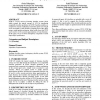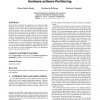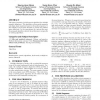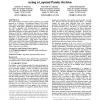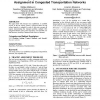109
click to vote
GECCO
2006
Springer
15 years 5 months ago
2006
Springer
XCSF is a novel version of learning classifier systems (LCS) which extends the typical concept of LCS by introducing computable classifier prediction. In XCSF Classifier predictio...
128
click to vote
GECCO
2006
Springer
15 years 5 months ago
2006
Springer
We present and evaluate a method for estimating the relevance and calibrating the values of parameters of an evolutionary algorithm. The method provides an information theoretic m...
101
click to vote
GECCO
2006
Springer
15 years 5 months ago
2006
Springer
In this article, we describe the application of an enhanced genetic algorithm to the problem of hardware-software codesign. Starting from a source code written in a high-level lan...
GECCO
2006
Springer
15 years 5 months ago
2006
Springer
We propose a new crossover that generalizes cycle crossover to permutations with repetitions and naturally suits partition problems. We tested it on graph partitioning problems ob...
106
Voted
GECCO
2006
Springer
15 years 5 months ago
2006
Springer
This paper proposes a hybrid genetic algorithm for multiple sequence alignment. The algorithm evolves guide sequences and aligns input sequences based on the guide sequences. It a...
101
click to vote
GECCO
2006
Springer
15 years 5 months ago
2006
Springer
A genomic computing network is a variant of a neural network for which a genome encodes all aspects, both structural and functional, of the network. The genome is evolved by a gen...
123
click to vote
GECCO
2006
Springer
15 years 5 months ago
2006
Springer
Spatial Extension PSO (SEPSO) and Attractive-Repulsive PSO (ARPSO) are methods for artificial injection of diversity into particle swarm optimizers that are intended to encourage ...
137
click to vote
GECCO
2006
Springer
15 years 5 months ago
2006
Springer
Adaptive Random Testing subsumes a class of algorithms that detect the first failure with less test cases than Random Testing. The present paper shows that a "reference metho...
107
click to vote
GECCO
2006
Springer
15 years 5 months ago
2006
Springer
The Layered Pareto Coevolution Archive (LAPCA) was recently proposed as an effective Coevolutionary Memory (CM) which, under certain assumptions, approximates monotonic progress i...
116
click to vote
GECCO
2006
Springer
15 years 5 months ago
2006
Springer
This paper deals with transport user equilibrium. A modified version of the ant colony system is proposed where the ant colony heuristic is adapted in order to take into account a...
